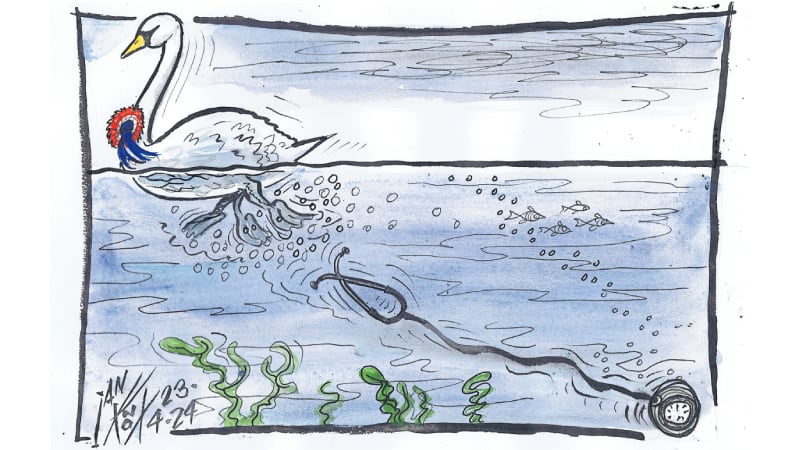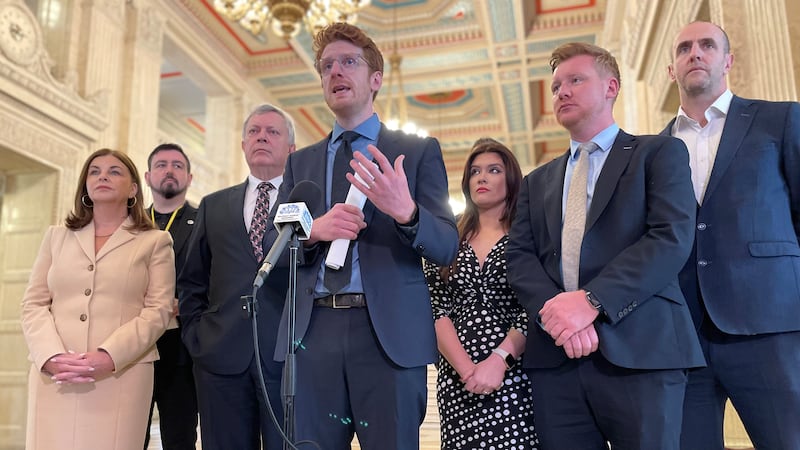In his recent address to the McGill Summer School in Donegal the DUP’s Edwin Poots spoke openly and at times positively about the Irish Language, saying “anyone who speaks and loves the Irish language is as much a part of Northern Ireland life as a collarette-wearing Orangeman”. He continued, however, to say that his party “opposes the introduction of Irish-language legislation that is more about developing a sense of national identity than it is about supporting the language itself,” and suggested that the language is used as a “weapon in a cultural war.”
While Mr Poots’ language is very much different from previous comments made by his party regarding Irish, the idea that there is a ‘cultural war’ taking place is incorrect and further polarises communities which may, with the correct language and approach used, be open to debate on the Irish language. Conradh na Gaeilge has been to the fore in the campaign for an act, has produced a document which contains proposals which would recognise, protect and promote the use of Irish in everyday life, but which would at no point pose any threat to any other cultures.
An Irish Language Act would put an end to prejudiced and whimsical decision making regarding the language and it would provide a platform for the language to thrive and become part of a continued, and much needed, cultural revival. I am personally unaware of any genuine member of the Irish language community who is interested in cultural warfare, or who would make any attempt to denigrate or suppress other cultures, in fact the opposite is generally the case.
None of what Conradh na Gaeilge has put forward contains any trappings of warfare, cultural or otherwise and this is the view held by the Irish Language community. In its meeting with Conradh na Gaeilge, the DUP delegation and Mr Poots himself agreed that the costs of the proposals were in fact ‘reasonable’ and the party leader accepted that there would be ‘legislative provision’ for the Irish language.
‘In this part of the world, the Irish language is everything it ought to be. It isn’t threatening. It isn’t politicised,’ stated Mr Poots. In the part of the world in question, there are Irish-language road-signs and there is an Irish-language commissioner, all of which is based on Irish-language legislation, which has been in place for decades.
How can road signage which contains the original, correct version of a place-name, be considered unacceptable? How can the appointment of an independent, objective commissioner, to ensure the provisions in a publicly funded act are implemented, be such an issue, when proper governance and financial scrutiny is central to the re-establishment of an assembly?
None of the proposals put forward by Conradh na Gaeilge will impact negatively on other cultures, indeed we are convinced that they would enhance them.
If the DUP genuinely believes that “anyone who speaks and loves the Irish language is as much a part of Northern Ireland life as a collarette-wearing Orangeman”, it should recognise and accept that the Irish language should be officially recognised through the means of a standalone act, as recommended by the United Nations, the Council of Europe, the Dáil and a majority of our own elected MLAs.
Ní féidir an dubh a chur ina gheal, ach seal. (You can only deny the truth for a while.)
Dr NIALL COMER
Uachtarán, Chonradh na Gaeilge
Béal Feirste BT 1
Give unborn same protection as the unhatched
American Human Rights campaigner Shelley Douglas says that ‘as time passes we will come to understand the violence of abortion.’
In the springtime years ago, robbing birds’ nests was a common pursuit among young country boys. Some would take the nest with the little eggs into school and the teacher would put it on display. Others would just take the eggs, break them open, examine the little squirming pink creatures inside and kill them or leave them to die.
In the well-known folk song The Verdant Braes of Screen, the young lover says: “I will climb a high, high tree and I’ll rob a wild bird’s nest, and I’ll bring back what I find there to the arms I love the best.”
It was all very acceptable. Some people would have objected but they would have been considered cranks. After all, these were only little birds in the egg with a limited life span anyway – they do live only for about a year.
However, time passed and more people came to understand the violence and inhumanity of this practice. Laws were enacted to protect the little developing life in the egg.
The UK Wildlife and Countryside Act 1981 makes it an offence to ‘take or destroy an egg of any wild bird’. Offenders can be fined up to £5,000 or sentenced to six months in prison. The Republic introduced similar legislation, the Wild Life Act 1976 and the north of Ireland introduced the Wild Life (NI) Order 1985.
The 8th Amendment of the Irish Constitution, enacted in 1983, offers similar protection to human beings in the womb, but my Sinn Féin colleague Mary Lou McDonald wants to repeal that article. She should call for a repeal of the Wild Life Act 1976, too, rather than appear to be more concerned about the unhatched than she is about the unborn.
FRANCIE BROLLY
Dungiven, Co Derry
Antithesis of all rights
Midwives are health professionals that we hear little about – they seem happy to do their great work without courting media or public attention. Indeed, this was embodied by the many generations of Irish Catholic midwives – among others – who cared for the material and spiritual needs of their patients with love and devotion. I personally was baptised at my birth by one, for whom I will always be grateful.
Sadly the views of Breedagh Hughes on the recent Westminster ruling (June 30) have consigned that reality to the dustbin of history. That their NI head would welcome any abortion as a ‘significant step forward’ is a contradiction, from a professional body that one would think that the timeless adage ‘do none harm’ would have been paramount.
However, if Ms Hughes view that the recent political decision is one of progressive evolution, why has an actual abortion never been shown on television – after all we have all seen countless other medical operations from heart bypasses to brain transplantations, but never an abortion? Is it because we know it for what it is and that for some masquerade as a right when in actuality it is the chief antithesis of all rights – the first of all is that of life Itself?
JDP McALLION
Clonoe, Co Tyrone
Bring back true values of BBC
I refer to the recent article by Denis Bradley (July 1) on the state of broadcasting/journalism in Northern Ireland and his subsequent interview on The Nolan Show. Is it not time the BBC(N.I) started to provide its fee paying public with some decent quality broadcasting /journalism rather than the daily unedifying diet of lazy and second rate offerings from Mr Nolan? Mr Bradley among other things described these appropriately as belonging to the bear pit. I would suggest that they are also sectarian forever picking over old sores and appealing to the lowest common denominator/denomination. Come on BBC ditch the unedifying Stephen Nolan and return to the true values of BBC broadcasting which informs and educates.
STEWART CUDDY
Holywood, Co Down
Sectarian head counts
Mr McMullan – ‘Birth of new and purer form of naked sectarianism’ (June 22) – makes much of head counts. The media does as well. What Mr McMullan has to understand is that the republican movement signed up to the Good Friday Agreement each dot and jot. I defy him or anyone to claim this is not so.
Republicans are obviously working to reunite this country – by consent. Head counts are for those who are on a sectarian agenda. Making headway in an environment that talks consent yet reverts to a sectarian count must be so difficult yet that is the task.
So Mr McMullan while you are doing your sectarian headcount, republicans are endeavouring to fulfil their commitment under the GFA.
MANUS McDAID
Derry City







